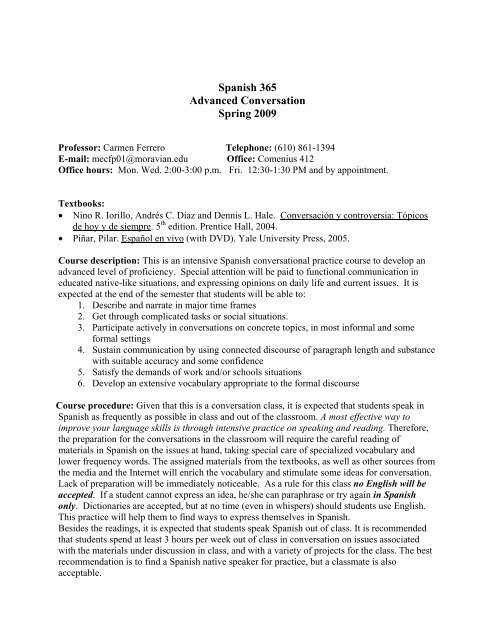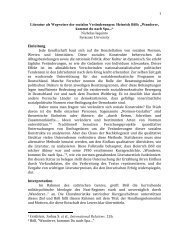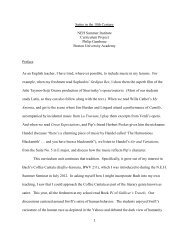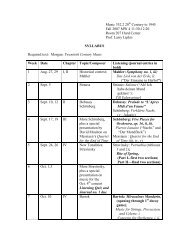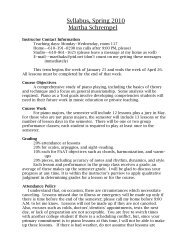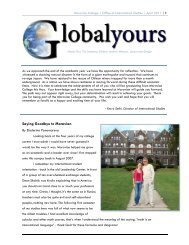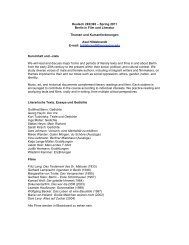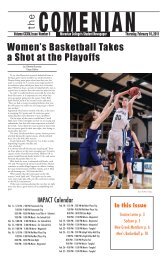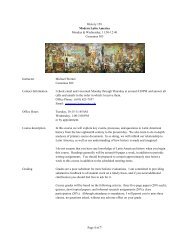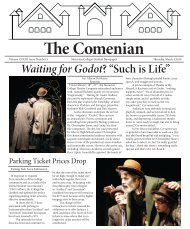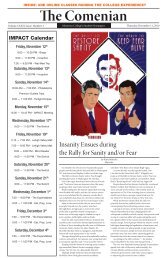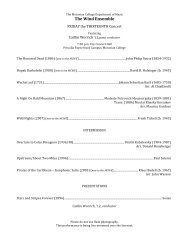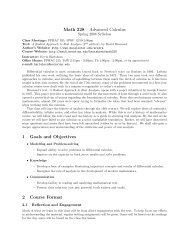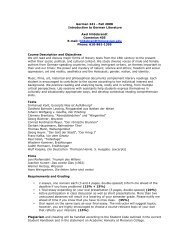Spanish 365 Advanced Conversation Spring 2009 - Moravian College
Spanish 365 Advanced Conversation Spring 2009 - Moravian College
Spanish 365 Advanced Conversation Spring 2009 - Moravian College
You also want an ePaper? Increase the reach of your titles
YUMPU automatically turns print PDFs into web optimized ePapers that Google loves.
<strong>Spanish</strong> <strong>365</strong><br />
<strong>Advanced</strong> <strong>Conversation</strong><br />
<strong>Spring</strong> <strong>2009</strong><br />
Professor: Carmen Ferrero Telephone: (610) 861-1394<br />
E-mail: mecfp01@moravian.edu Office: Comenius 412<br />
Office hours: Mon. Wed. 2:00-3:00 p.m. Fri. 12:30-1:30 PM and by appointment.<br />
Textbooks:<br />
• Nino R. Iorillo, Andrés C. Díaz and Dennis L. Hale. Conversación y controversia: Tópicos<br />
de hoy y de siempre. 5 th edition. Prentice Hall, 2004.<br />
• Piñar, Pilar. Español en vivo (with DVD). Yale University Press, 2005.<br />
Course description: This is an intensive <strong>Spanish</strong> conversational practice course to develop an<br />
advanced level of proficiency. Special attention will be paid to functional communication in<br />
educated native-like situations, and expressing opinions on daily life and current issues. It is<br />
expected at the end of the semester that students will be able to:<br />
1. Describe and narrate in major time frames<br />
2. Get through complicated tasks or social situations.<br />
3. Participate actively in conversations on concrete topics, in most informal and some<br />
formal settings<br />
4. Sustain communication by using connected discourse of paragraph length and substance<br />
with suitable accuracy and some confidence<br />
5. Satisfy the demands of work and/or schools situations<br />
6. Develop an extensive vocabulary appropriate to the formal discourse<br />
Course procedure: Given that this is a conversation class, it is expected that students speak in<br />
<strong>Spanish</strong> as frequently as possible in class and out of the classroom. A most effective way to<br />
improve your language skills is through intensive practice on speaking and reading. Therefore,<br />
the preparation for the conversations in the classroom will require the careful reading of<br />
materials in <strong>Spanish</strong> on the issues at hand, taking special care of specialized vocabulary and<br />
lower frequency words. The assigned materials from the textbooks, as well as other sources from<br />
the media and the Internet will enrich the vocabulary and stimulate some ideas for conversation.<br />
Lack of preparation will be immediately noticeable. As a rule for this class no English will be<br />
accepted. If a student cannot express an idea, he/she can paraphrase or try again in <strong>Spanish</strong><br />
only. Dictionaries are accepted, but at no time (even in whispers) should students use English.<br />
This practice will help them to find ways to express themselves in <strong>Spanish</strong>.<br />
Besides the readings, it is expected that students speak <strong>Spanish</strong> out of class. It is recommended<br />
that students spend at least 3 hours per week out of class in conversation on issues associated<br />
with the materials under discussion in class, and with a variety of projects for the class. The best<br />
recommendation is to find a <strong>Spanish</strong> native speaker for practice, but a classmate is also<br />
acceptable.
REQUIREMENTS AND EVALUATION:<br />
Asistencia (Attendance): Faithful attendance is expected, since continuous practice is needed in<br />
order to learn a language.<br />
- You need to come to class and be on time. The first 3 absences will not be penalized, but<br />
will affect your class participation. If you will miss class for a religious holiday, please<br />
let me know ahead of time so we can make arrangements for missed work.<br />
- More than three (3) absences, for any reason, will result in a lowering of the final<br />
grade by one point for every additional absence (every absence over three). Exceptions<br />
may be granted only in extraordinary circumstances such as prolonged illness or family<br />
emergency; these situations may require additional documentation through Learning<br />
Services and are not automatically guaranteed. The student would need to make<br />
arrangements to complete missed work.<br />
- Arriving late (10 minutes or more) to class more than three times will equal one<br />
absence.<br />
- Please turn off your cell phone before entering class.<br />
Remember: Requests to excuse absences at the end of the semester will not be considered.<br />
Students have the responsibility of keeping track of their own absences. No reminders<br />
will be given.<br />
Students may NOT check their cell phone messages while in class. Please, be<br />
very respectful of this requirement.<br />
Participación activa en clase (In-class active participation) (35% of final grade)<br />
Active class participation is necessary to succeed in this class. Active participation involves<br />
collaborating in paired and group activities, volunteering answers for the exercises, having done all<br />
the assigned work, and speaking in class discussions and debates. Simply being present, looking<br />
attentive and taking notes is not considered active participation. Remember also that your class<br />
participation grade will suffer beginning with the first absence (regardless of the reason for it). The<br />
professor will assign a weekly grade for the level of preparation and participation of each student.<br />
The weekly class grades will be as follows:<br />
A=95 Excellent participation (the student answers questions and offers interesting<br />
comments without the need of the professor or the debate leader calling on him/her. The<br />
comments and answers show that the student has thoroughly prepared the assigned material and<br />
has done the necessary background research to understand it well).<br />
B= 85 Good participation (the student answers questions and offers interesting comments<br />
whenever the professor or debate leader calls on him/her. Sometimes, the student participates<br />
without being asked. The comments and answers show that the student has prepared the<br />
assigned material and has done the necessary background research to understand it quite well).<br />
C=75 Fair participation (the student answers questions and offers comments only when the<br />
professor or debate leader calls on him/her. The comments and answers show that the student<br />
has prepared the assigned material, but has not done the entire necessary background research to<br />
understand it).
D=65 Poor participation (the student answers questions and offers very brief comments only<br />
when the professor or debate leader calls on him/her. The comments and answers show that the<br />
student has a poor preparation of the assigned material and has not done the necessary<br />
background research to understand it).<br />
F=55 Lack of participation (the student does not answer questions and does not offer any<br />
comments in the class or group discussion. The lack of comments and answers, as well as<br />
incorrect answers, show that the student has not prepared the assigned material or, if he/she has<br />
prepared it, it has been in a careless or incomplete way).<br />
Attendance to a minimum of 3 activities of el Club de español during the semester is required as<br />
participation.<br />
Extra credit: Students without a single absence throughout the semester will receive two extra<br />
points in their final grade.<br />
Listening to Radio Stations in <strong>Spanish</strong> on Internet: Weekly summaries (20% of final grade)<br />
“Radio is a very important aspect of the everyday life of the <strong>Spanish</strong> average citizen. Spain is a country<br />
that loves radio and couldn't live without it, so it's hardly surprising that some of the most respected and<br />
influent journalists work in radio. We Spaniards get up with the radio, listen to the radio at work, on the<br />
bus, in taxis or in bed. … Radio is a core element of <strong>Spanish</strong> culture.”<br />
www.donquijote.org/culture/spain/customs/radio.asp<br />
This quote may help students understand that talk radio is an essential part of <strong>Spanish</strong> life. That<br />
is why students have to listen to the 3 radio stations listed below for a minimum of 2 hours a<br />
week. Students may pick several programs of different stations depending on their own<br />
preferences, but it is advisable that they listen to a variety of them throughout the semester so<br />
that they get familiarized with vocabulary related to many fields. Listening to the radio in<br />
<strong>Spanish</strong> will become a habit and you will learn a lot about politics, culture, daily events, and<br />
people´s opinions and values regarding many issues. You will also acquire a real sense of how<br />
<strong>Spanish</strong> speaking people change registers and tone depending on the seriousness of the topic or<br />
issue discussed. These programs will help you understand how they express irony and their sense<br />
of humor (which is not always easy to perceive at first in a different language). You will build<br />
your vocabulary from the most educated terms to everyday slang. You will hear people of all<br />
ages and backgrounds from different regions of the <strong>Spanish</strong> speaking world (Spain and Latin<br />
America) being interviewed or calling into the programs.<br />
Advice of the professor: Do not worry if you do not understand that much at the beginning, just<br />
keep listening and you will be surprised at how much more you can understand as weeks go by.<br />
The three radio stations are:<br />
http://www.ondacero.com<br />
Herrera en la onda, Te doy mi palabra (Tertulia, entrevistas, comentarios, humor)<br />
Al primer toque, Radioestadio (deportes)<br />
La rosa de los vientos (historia, naturaleza, ciencia, parapsicología, misteriosos<br />
descubrimientos)<br />
Onda agraria, Linde y ribera (temas del campo y la naturaleza)<br />
Como el perro y el gato (animales domésticos)
Gente viajera (viajes por el mundo)<br />
En buenas manos (temas de medicina, salud y sanidad)<br />
Noticias al mediodía<br />
http://www.cope.es/<br />
La brújula, La mañana, La tarde con Cristina, La linterna, A cielo abierto (Tertulia,<br />
entrevistas, actualidad, comentarios)<br />
El tirachinas, Tiempo de juego (deportes)<br />
La rebotica (temas de salud, medicina y sanidad)<br />
Bueno es saberlo (comentarios sociales y variedades)<br />
Agropopular (temas del campo)<br />
El albero (temas taurinos)<br />
http://www.cadenaser.com/<br />
Hoy por hoy, Hora 14, La ventana, A vivir, Hora 20, Hora 25 (Tertulias, noticias,<br />
comentarios, actualidad, entrevistas)<br />
Carrusel deportivo, El larguero (deportes)<br />
Hora 25 de los negocios (asuntos de economía)<br />
De nueve a nueve y media (programa de variedades)<br />
Hablar por hablar (llamadas de oyentes, comentarios)<br />
You can also listen to news and other programs in the radio stations you will find in<br />
http://www.rtve.es/rne/envivo.htm<br />
Radio Nacional de España, Radio 5, Todo Noticias<br />
Every Friday, students have to summarize in <strong>Spanish</strong> and then e-mail to the professor the content<br />
of the programs they have listened to on the radio that week. The summary must be specific<br />
enough for the professor to know that the student did not simply read about the program on the<br />
webpage of the radio station or listened to just the first 10 minutes of a program. The weekly<br />
grade will be based on how much students understand and how well they summarize the content<br />
of the program.<br />
Dossier (5%): Throughout the semester, students will develop a dossier of the materials collected<br />
during the semester regarding the topics of discussion and their presentations. The collection must<br />
also include their personal typed <strong>Spanish</strong>-<strong>Spanish</strong> dictionary in which they will collect all the words<br />
they have learned during the semester. The dictionary can include low frequency words,<br />
prepositions, and other useful words that will contribute to their improvement in their oral<br />
expression as educated speakers in <strong>Spanish</strong>. The dossier will be handed in on the last day of class.<br />
For every late day the grade for the dossier will be reduced by one letter grade.<br />
Mid-term oral exam (15%): The oral exam recorded on tape or CD will concentrate on<br />
developing orally one topic (chosen by the student) taken from the book "Conversación y<br />
controversia". This exam will consist on a 15 minute recorded presentation in which the student<br />
will express his/her opinion. On the designated date, the student will hand in his/her cassette<br />
which the professor will evaluate according to the guidelines provided by the American Council<br />
for the Teaching of Foreign Languages (ACTFL) for Oral Proficiency.
Power point oral presentation in class (10%): This presentation will be a 20-25 minute<br />
presentation to discuss and develop a specific issue not related to the topics discussed in class.<br />
The selection of each topic should be consulted with and approved by the professor at least one<br />
week in advance of the presentation date. This can be done by e-mail. At the end of each<br />
presentation, the student will elicit the general discussion of the topic from the class by<br />
proposing a set of three or four questions regarding the topic he/she discussed.<br />
Final oral interview (15%): in which the student must demonstrate progress in his/her language<br />
skills from the beginning of the semester.<br />
Taped oral exams and oral presentations must be handed in or done on the assigned date (see<br />
“Programa del curso”). Important note: For every late day that a taped oral exam is handed<br />
in, one letter grade will be deducted from the grade; for example, an exam due on a Monday that<br />
would receive a B if handed in on time, will automatically receive a D if handed in on<br />
Wednesday. Saturday and Sunday count as two days.<br />
The final course grade will be calculated as follows:<br />
Daily class participation ---------------------------- 35%<br />
13 weekly summaries of radio programs --------- 20%<br />
1 taped (mid-term) oral exam ---------------------- 15%<br />
1 class power point presentation ----------------- 10 %<br />
Dossier --------------------------------------------------- 5%<br />
Final oral interview ----------------------------------- 15%<br />
Academic Honesty:<br />
It is your responsibility to make sure you are familiar with the Policy on Academic Honesty at<br />
<strong>Moravian</strong> <strong>College</strong>. Plagiarism (presenting someone else’s words or ideas as your own) and<br />
cheating are serious offenses and will not be tolerated. Homework is assumed to be done<br />
individually unless otherwise specified. For example, while you may study together, it is not<br />
acceptable to write “joint” homework and turn in two copies.<br />
Note especially:<br />
“When writing creative or research papers in a foreign language, students may not use electronic<br />
translation services. Utilizing such tools without express permission of the instructor constitutes<br />
plagiarism. The use of electronic dictionaries for single-word inquiries or short idiomatic<br />
expressions is permissible at the discretion of professors in the Department of Foreign<br />
Languages.” (<strong>Moravian</strong> <strong>College</strong> Academic Honesty Policy, my emphasis)<br />
Americans with Disabilities Act:<br />
Any student with a disability who would like to request accommodations under the ADA must<br />
meet first with someone to evaluate the case and give recommendations to the professor. For<br />
learning disabilities and/or ADD/ADHD, see Mrs. Laurie Roth in the Office of Learning<br />
Services; for all other disabilities, see Dr. Ronald Kline in the Counseling Center.
** The professor reserves the right to modify class topics and assignments**<br />
Any changes will be announced by the professor<br />
PROGRAMA DE CURSO<br />
L= lunes M=miércoles V=viernes<br />
CC = Conversación y Controversia (Students have to prepare the questions of the section<br />
“repaso gramatical” of each chapter for the day assigned)<br />
EV=Español en vivo (Students have to prepare the section “Preguntas” of each chapter for the<br />
day assigned)<br />
Enero<br />
Semana 1<br />
L 19 Introducción al curso<br />
M 21 EV Cap. 1 La casa<br />
V 23 CC Cap. 2 El año 2100<br />
Semana 2<br />
L 26 EV Cap. 2 La familia<br />
M 28 EV Cap. 3 El trabajo y la rutina<br />
V 30 CC Cap. 5 El terrorismo<br />
Febrero<br />
Semana 3<br />
L 2 EV Cap. 4 Los recuerdos<br />
M 4 CC Cap. 6 El Ser Supremo<br />
V 6 EV Cap. 5 La comida<br />
Semana 4<br />
L 9 EV Cap. 6 La mujer<br />
M 11 Documental<br />
V 13 EV Cap. 7 La educación<br />
Semana 5<br />
L 16 CC Cap. 9 La eutanasia<br />
M 18 EV Cap. 8 El emigrante I<br />
V 20 Debate de Película Oral Exam: Tape due<br />
Semana 6<br />
L 23 CC Cap. 10 La migración<br />
M 25 EV Cap. 9 El emigrante II<br />
V 27 CC Cap. 12 La censura<br />
Marzo<br />
<strong>Spring</strong> Break<br />
Semana 7<br />
L 9 EV Cap. 10 Los problemas sociales<br />
M 11 Presentaciones orales de PP 1: __________________<br />
V 13 CC Cap. 13 El suicidio
Semana 8<br />
L 16 Presentaciones orales de PP 2: __________________<br />
M 18 EV Cap. 11 El futuro<br />
V 20 Presentaciones orales de PP 3: __________________<br />
Semana 9<br />
L 23 Presentaciones orales de PP 4: __________________<br />
M 25 CC Cap. 14 Las armas de fuego<br />
V 27 Presentaciones orales de PP 5: __________________<br />
Semana 10<br />
L 30 Presentaciones orales de PP 6: _________________<br />
Abril<br />
M 1 EV Cap. 12 La diversidad lingüística I<br />
V 3 Presentaciones orales de PP 7: __________________<br />
Semana 11<br />
L 6 CC Cap. 15 Las naciones unidas<br />
M 8 EV Cap. 13 Diversidad lingüística II<br />
Semana 12<br />
M 15 Presentaciones orales de PP 8: _________________<br />
V 17 CC Cap. 16 La pena capital, pena de muerte<br />
Semana 13<br />
L 20 EV Cap. 14 Diferencias dialectales<br />
M 22 EV Cap. 15 Diversidad étnica y cultural<br />
V 24 CC Cap. 20 El Espanglish<br />
Semana 14<br />
L 27 EV Cap. 16 Identidad<br />
M 29 EV Cap. 17 Música<br />
Mayo<br />
V 1 EV Cap. 18 Arte y cultura


